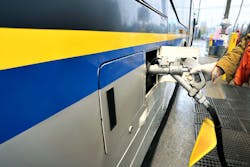TransLink introducing renewable diesel to its bus fleet
TransLink is bringing renewable diesel – a fuel made from organic waste – to its bus fleet as a way to immediately cut emissions as outlined in its Climate Action Strategy.
“The time to take climate action is now,” says TransLink CEO Kevin Quinn. “By introducing renewable diesel to our bus fleet, we’re doing our part to move away from fossil fuels. Renewable diesel will deliver rapid GHG reductions while we work to electrify our fleet.”
TransLink’s Climate Action Strategy contains three target dates and associated greenhouse gas emissions (GHGs) reduction goals:
- Reduce GHGs 45 percent from 2010 levels by 2030
- Operate a zero-emissions fleet by 2040
- Achieve net-zero GHGs by 2050
TransLink reports 64 percent of its total emissions are produced from diesel vehicles and the use of renewable fuel could lead to an 80 percent GHG reduction across the whole lifecycle, which includes the production and consumption of fuel.
Surrey Transit Center will be the first bus depot to transition to renewable diesel, effective Jan. 1, 2024. The center is home to about 90 buses and the transition of the single depot will reportedly reduce total GHG emissions by 6,550 metric tons, which is five percent of TransLink’s total emissions.
TransLink says it plans to introduce renewable diesel to additional transit centers in 2024 and is studying if renewable diesel is an option for SeaBus and West Coast Express.
About the Author

Mischa Wanek-Libman
Group Editorial Director
Mischa Wanek-Libman is director of communications with Transdev North America. She has more than 20 years of experience working in the transportation industry covering construction projects, engineering challenges, transit and rail operations and best practices.
Wanek-Libman has held top editorial positions at freight rail and public transportation business-to-business publications including as editor-in-chief and editorial director of Mass Transit from 2018-2024. She has been recognized for editorial excellence through her individual work, as well as for collaborative content.
She is an active member of the American Public Transportation Association's Marketing and Communications Committee and served 14 years as a Board Observer on the National Railroad Construction and Maintenance Association (NRC) Board of Directors.
She is a graduate of Drake University in Des Moines, Iowa, where she earned a Bachelor of Arts degree in Journalism and Mass Communication.
